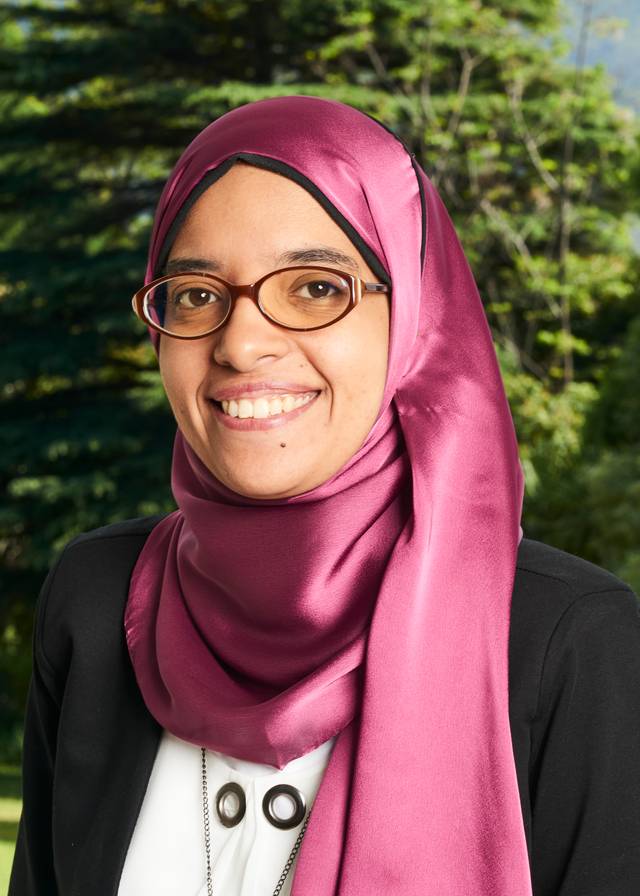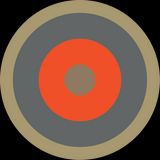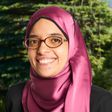
Scholar Stories
True Grit: From Pharmacy to Robotics and AI
In July 2019 Mona Allaam (Egypt & UCT, 2019) arrived at the Reconciliation Workshop. She stuck out – she was new to the group (having missed the January workshop), she was very short, and she was wearing a hijab. During an identity activity she joined the group who had never felt disadvantaged because of their gender. She was the only woman to do so. She said later that she found theinsistence from others that she must have made a mistake, along with suddenly being the focus of attention, very overwhelming, to the point of having a panic attack. She persevered in participating, containing her fear and anxiety.
Mona has a lifetime of practice, of swimming against the current and feeling like she doesn’t fit in. She’s a diminutive, stubborn, awkward, dryly funny pharmacist and roboticist, who does carpentry in her spare time. To be any other way is an anathema to her, even though at times it’s very hard.
Mona Emad El-din Allaam was born in Port Said, Egypt in 1989. From the age of four she wanted to build things. Her parents and teachers bought her equipment, tools, blocks to build with, and puzzles. Mona’s younger brother loved to draw animals, and their parents would pin up their drawings on a wall in their home, noting what they thought of them. As a child she watched the Egyptian technology show Graphic every Friday, and she’d follow her father around as he did handiwork, learning how his tools worked.
As a teenager Mona began to stick out. Carpentry and engineering were not normal hobbies for girls in the Middle East. She felt privately that it was her parents’ fault for allowing her to be so different. Mona began a medical degree at university, a choice that would please her family, but she hated it. She still wanted to build things, but changing to engineering was impossible because she had the wrong high school subjects. A switch to Pharmacy helped, but Mona swore that she would find a way to do both. “I always knew what I wanted to do, but I didn’t know how to make the right decisions,” she said on the phone in late 2020.
While studying pharmacy, Mona began to teach herself engineering, and became obsessed with robotics and artificial intelligence. She borrowed boxes of tools from friends and emailed everyone in her network in order to find out where to start, what to study and what to buy. After graduating Pharmacy, she started studying robotics online, working through the Khan Academy, Coursera and Udacity. She worked as a hospital pharmacist by day and an amateur roboticist at night, for years.
In 2015 she built her first circuit. It was a simple LED light sensor. She laughs a wheezy laugh, entertained by how pleased she was at the time. “Oh my god! I showed it to all my family and friends and sent it to everybody I knew. I was so, so happy. It was just an analogue, no programming, and now I can’t believe I made a huge deal out of an LED circuit!”
Mona gradually developed a network of mentors and doors began to open, leading to a research assistantship at the Medical Micro and Nano Robotics Research Laboratory (MNRLab) at the German University in Cairo. In 2018 she left pharmacy and started applying for scholarships to study Biomedical Engineering, working part time in a robotics lab.
The universities she applied for were reluctant to admit her without an engineering degree, imperilling her Mandela Rhodes Scholarship. Eventually Mona got in touch with Dr Martha Holmes of UCT, and registered for a Masters in Neuroscience in 2019. Mona is currently developing an automatic tool to look at and segment the MRI scans of the brains of newborn infants born to HIV positive mothers. She hopes this will lead to a job in robotic vision. 2019 and 2020 were transformative for several reasons. While in South Africa, Mona was diagnosed with Autism Spectrum Disorder and Asperger’s Syndrome, characterised by high functioning, difficulty with social interactions, and obsessive interests.
“I would like people to know this because I want to normalise it. I am a person with learning difficulties – I didn’t know that growing up.” “Girls tend to mask it; my grades were always A Plus.” Mona says the diagnosis has given her peace and a way of understanding her experiences.
Being a Mandela Rhodes Scholar has given her a deeper appreciation of the African identity beyond her home country. Today she also credits her parents for treating her exactly the same way they treated her brother when they were growing up. She realised the significance of this during the identity exercise at the Reconciliation Workshop. “Gender never comes into my mind. I never think I shouldn’t do this because it’s a man’s thing, or I shouldn’t say this to a man. I want to stand with the boys. I have never felt less privileged because of my gender. I’ve become really happy and proud of how my parents raised me.









